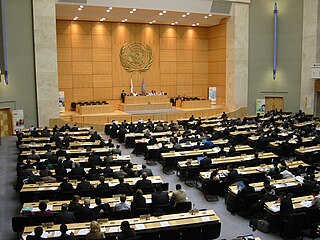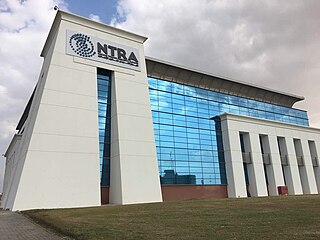
World Telecommunication and Information Society Day is an international day proclaimed in November 2006 by the International Telecommunication Union Plenipotentiary Conference in Antalya, Turkey, to be celebrated annually on 17 May. [1]

World Telecommunication and Information Society Day is an international day proclaimed in November 2006 by the International Telecommunication Union Plenipotentiary Conference in Antalya, Turkey, to be celebrated annually on 17 May. [1]
The day had previously been known as 'World Telecommunication Day' to commemorate the founding of the International Telecommunication Union on 17 May 1865. [2] It was instituted by the Plenipotentiary Conference in Malaga-Torremolinos in 1973.
The main objective of the day was to raise global awareness of social changes brought about by the Internet and new technologies. It also aims to help reduce the digital divide.
World Information Society Day was an international day proclaimed to be on 17 May by a United Nations General Assembly resolution, following the 2005 World Summit on the Information Society in Tunis. [3]
In November 2006, the ITU Plenipotentiary Conference in Antalya, Turkey, decided to celebrate both events on 17 May as World Telecommunication and Information Society Day. [1]
The International Telecommunication Union Telecommunication Standardization Sector (ITU-T) is one of the three Sectors (branches) of the International Telecommunication Union (ITU). It is responsible for coordinating standards for telecommunications and Information Communication Technology, such as X.509 for cybersecurity, Y.3172 and Y.3173 for machine learning, and H.264/MPEG-4 AVC for video compression, between its Member States, Private Sector Members, and Academia Members.

The International Telecommunication Union (ITU) is a specialized agency of the United Nations responsible for many matters related to information and communication technologies. It was established on 17 May 1865 as the International Telegraph Union, significantly predating the UN and making it the oldest UN agency. Doreen Bogdan-Martin is the Secretary-General of ITU, the first woman to serve as its head.
Telecommunications in Tunisia includes telephones, radio, television, and the Internet. The Ministry of Communication Technologies, a cabinet-level governmental agency, is in charge of organizing the sector.

The World Summit on the Information Society (WSIS) was a two-phase United Nations-sponsored summit on information, communication and, in broad terms, the information society that took place in 2003 in Geneva and in 2005 in Tunis. WSIS Forums have taken place periodically since then. One of the Summit's chief aims is to bridge the global digital divide separating rich countries from poor countries by increasing internet accessibility in the developing world. The conferences established 17 May as World Information Society Day.
The global digital divide describes global disparities, primarily between developed and developing countries, in regards to access to computing and information resources such as the Internet and the opportunities derived from such access.

Information and communications technology (ICT) is an extensional term for information technology (IT) that stresses the role of unified communications and the integration of telecommunications and computers, as well as necessary enterprise software, middleware, storage and audiovisual, that enable users to access, store, transmit, understand and manipulate information.
The World Summit Awards (WSA) rewards Information and Communications Technologies projects that have a positive impact on society at the local level. The award was initiated in 2003, within the framework of the United Nations World Summit on the Information Society. After the UN General Assembly adopted Resolution 56/183. The awards are open to companies, organizations, or individuals from any of the UN and the UNESCO Member States. They are divided into 8 different categories. The world summit awards are managed by the International Center for New Media (ICNM), a non-profit organization based in Salzburg, Austria. ICNM was founded by Peter A. Bruck, in 2002.
The ICT Development Index (IDI) is an index published by the United Nations International Telecommunication Union based on internationally agreed information and communication technologies (ICT) indicators. This makes it a valuable tool for benchmarking the most important indicators for measuring the information society. The IDI is a standard tool that governments, operators, development agencies, researchers and others can use to measure the digital divide and compare ICT performance within and across countries.
Over the past decade, there has been an increase in the use of information and communications technologies (ICTs) in China. As the largest developing country in the world, China faces a severe digital divide, which exists not only between mainland China and the developed countries, but also among its own regions and social groups.
The African Telecommunications Union (ATU) is an organization in Africa that combines countries and mobile telecommunications providers in an attempt to dramatically increase development of the continent's information and communication technology (ICT) infrastructure.

Hamadoun Ibrahim Touré of Mali was Secretary General of the International Telecommunication Union (ITU), the specialized agency of the United Nations dedicated to information and communication technologies (ICTs), from 2007 to December 2014. He was re-elected for a second four-year term in 2010. Since 2007, he has worked to fulfil ITU's mandate to 'connect the world' and help achieve the Millennium Development Goals.
The Ministry of Information Technology and Telecommunication, abbreviated as MoITT) is a Cabinet-level ministry of the Government of Pakistan concerned with Information Technology and Telecommunications.

The Asia Pacific Telecommunity (APT) was founded on the joint initiatives of the United Nations Economic and Social Commission for Asia and the Pacific (UNESCAP) and the International Telecommunication Union (ITU).
The Telecommunications and Digital Government Regulatory Authority is the federal telecommunications regulatory agency of the United Arab Emirates since 2003.

Infocommunications is the natural expansion of telecommunications with information processing and content handling functions including all types of electronic communications on a common digital technology base, mainly through Internet technology.

Houlin Zhao is a Chinese engineer who served as the Secretary-General of the International Telecommunication Union (ITU) from 2015 to 2022. He was first elected at the 2014 Plenipotentiary Conference in Busan, and re-elected at the 2018 Plenipotentiary Conference in Dubai. ITU is the specialized United Nations Agency for Information and Communication Technology (ICT), working on promotion, collaboration, and standardization.
Mohamed Ezzedine Mili was a Tunisian diplomat who served as the Secretary-General of the International Telecommunication Union from 1967 to 1982, including an ad interim tenure from 1967 to 1973.

The National Telecommunications Regulatory Authority, commonly known as NTRA, is the Egypt government-approved regulatory and competition authority that was established in accordance of the Egyptian telecommunication regulation law No. 10/ 2003 as the national Authority equipped to regulate and administer the telecommunications region. Regulating the competition environment between the operators inside the industry according to the Egyptian constitution was a huge mandatory case after the huge rate of telecommunication technology growth, as well as ensuring the availability of qualitative and green telecommunications services.

Doreen Bogdan-Martin is an international civil servant and current Secretary-General of the International Telecommunication Union. She was elected at the 2022 ITU Plenipotentiary Conference in Bucharest, and as the first woman in the 157-year history of the ITU to become the Secretary-General. Previously, she was the first woman to become an Elected Official of the ITU, as the Director of the Telecommunication Development Bureau of the ITU.

The Global Standards Symposium (GSS) is a statutory meeting that precedes the World Telecommunication Standardization Assembly. GSS provides a high-level forum for discussion and coordination open to all. The GSS was created by the ITU's treaty-making conference, the Plenipotentiary Conference 2006 in Antalya, Turkey with Resolution 122.